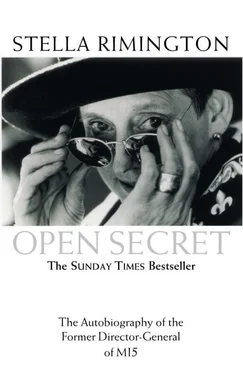What all this focus on university and nothing beyond really indicated was that we all, even the girls, thought, subconsciously if not overtly, that any career we did have was not going to last. It would be only a temporary interlude until we got married, when we would stay at home to look after our husbands and children. So the important thing was the education, not what you did with it. Nobody, least of all the teachers, would have admitted that, but I am sure that is how it was. Others, even less enlightened, thought that it was not worth sending girls to university at all. I can remember one of my father’s friends saying to my parents in my hearing, ‘Surely you are not going to send that girl to university. She will only get married and that will be a complete waste.’ Of course, adults were always asking us what we wanted to be, as they always do of children, but when that question was asked of a girl, it was never meant seriously. I had no idea how to answer the question, partly because I knew it was not serious and partly because the only thing I knew at that stage was that I wanted to do or be something out of the ordinary and exciting. So I used to reply that I was going to be an airline pilot, which was something women could not do in those days, so the conversation was effectively brought to an end. Not surprisingly, as a result of all this, girls did feel that most of the focus was on the boys and they were taken less seriously. If there were a limited amount of money to be spent, it would be spent on the boy, because he would eventually have to be the breadwinner for his family. To do my parents credit, I personally never felt that I was denied anything that mattered to me because I was only a girl, but I know some girls did.
Today the focus has changed. It is expected that girls will have long-term careers.
Career advice or ‘counselling’ as all advice seems to be called nowadays, is offered from the age of fourteen. But now I am afraid that the sort of schools I went to may have swung too far the other way, almost to the point of making girls feel inadequate if they decide that they would prefer to spend more time looking after their homes and family. I know how hard it is to cope with a full-time job and small children, particularly in circumstances where there is not enough money to pay for qualified child-care at home. It is difficult, and even the toughest and most determined can wilt under the strain. Not everyone can cope, though many have no choice. But if schools like the one I attended are not quite careful and subtle about the message they give to their pupils, they may make a generation of young women feel that they are inadequate failures, if they are not both high-flying career women and successful wives and mothers.
I grew to enjoy my time at Nottingham Girls’ High School, where at first I was always in the top few in the class. But by the time I was about sixteen, I began to make less effort and to cease to conform. The terrifying but excellent teachers passed out of my life, and we were in the hands of young women who had just left university, and did not have the power to force learning. I easily got bored and when things started to become more difficult I was not prepared to make the effort. My attitude to school changed and school’s attitude to me changed too. From being quite highly thought of by the teachers, I began to be regarded as something of a rebel, though as rebels often do, I kept a large group of friends. When I reached the sixth form, and elections for Head Girl were held – the election was by voting by the sixth form and the teachers – though I believe I was the choice of the girls, I was blackballed by the teachers. Teachers in girls’ schools in those days did not have a great deal of time for those who did not conform. All this ended by my failing one of my three A Level subjects, Latin, and having to stay at school for another year to re-sit. It was decided that the only person who would teach me enough Latin to get me through was Miss Todd, one of the old school, so I fell back into the hands of the real teachers again and of course passed easily the second time round. What they did, those female teachers of the old school, was subtly to imply respect for the ability of those they were teaching, so that in some way a partnership was formed, neither side of which could let the other down. It was very effective. As I had stayed on for a third year, it was decided that I would sit the Oxford and Cambridge entrance exams, and I applied to Newnham. I was called for interview but when I got there I felt very much a fish out of water, wearing the wrong clothes, from the wrong background and quite unable to deal with the sharp and rather patronising female dons. They sat so cosily on their sofas, quizzing me about an interesting theory I had put forward about some poet in my essay, that I had in fact lifted lock stock and barrel from a book one of them had written.
It was during my journeys on the bus to school that I met John Rimington whom I was later to marry. His father was a Coal Board official and they lived in a Coal Board house called ‘The Grange’, in Trowell, that gloomy village between Ilkeston and Nottingham which surprised the world in 1951 by being pronounced ‘Festival Village’ for the Festival of Britain.
Whoever chose it must have been suffering from an excess of political correctness. Confused foreign tourists used to arrive there looking for what they thought was going to be some thatched cottage idyll only to find themselves contemplating the main road to Nottingham, passing through a ribbon development of redbrick semis which did not even have a pub.
‘The Grange’ seemed to me extremely grand. It was a brick-built detached house in its own quite sizeable garden. Its drawbacks were that it was just beside the railway line, and it suffered even more than we did from ‘Duckhams’ as the wind was more frequently in their direction than ours. John and I met on the bus when we were sixteen and both just entering the sixth form of our respective schools – he was at Nottingham High School. I thought him rather quaint and old-fashioned. He used to write verse in a perfect, neat handwriting in a black stiff-backed notebook and would occasionally send me letters, equally beautifully written. Our acquaintance was reinforced at the dancing classes, at which the sixth formers of the two schools were allowed to meet and fraternise.
On our side, Miss Pretty presided to make quite sure there was no hanky-panky. I think she terrified the boys even more than she did us. She made very sure that we were all dressed in a seemly manner – we were allowed not to wear school uniform. Her standards were severe and unwavering. I remember once wearing what I regarded as a rather fetching scarf tied round the neck of my jumper. This did not meet Miss Pretty’s exacting standards.
‘Have you got a sore throat, Stella?’ she asked.
‘No Miss Pretty.’
‘Then take off that silly scarf.’
So ended my fashion statement.
John’s and my acquaintance did not get much beyond the dancing classes and occasional visits to each other’s houses for tea during our school days. He got a scholarship to Cambridge and went off to do his National Service and, after successfully completing my A Levels, I got a place at Edinburgh University and set off there in October 1954 to read English. I never expected to see him again.
I spent my last summer at school, the summer of 1953, working in Paris as an au pair . In those days young people did not routinely go off travelling in the year between school and university, and this sort of experience was the alternative. It was quite a shock, and helped me to sympathise with some of the young girls we later employed as au pairs in London. I was working for a French doctor and his wife, who had five children. The oldest was a boy of about nine and the youngest a baby. I was totally ill equipped for this experience, a provincial girl with no knowledge of anything much outside my narrow upbringing. I had only been abroad once before, on a school trip to Brittany, when we stayed in a convent in Lamballe and were shepherded everywhere by the nuns. My main recollection of that holiday was the anxiety struck into the nuns by the arrival of a telegram addressed to me at the convent. It was delivered just as we had sat down to dinner and I was called out to be given this missive by a very caring-looking nun, who was obviously convinced that my nearest and dearest had been struck down with some dreadful tragedy. I opened the envelope and inside was a telegram form with, written on it in pencil, in spidery French handwriting: ‘ Tassed (sic) all subjects ’ These were my O Level results which my parents, instructed by me before I left, had opened and telegraphed on. I was happy, but the telegram really set the cat among the pigeons, as nobody else’s family had sent anything. There was a wild scramble for the one and only phone, which totally disrupted dinner and greatly upset the nuns who took meals rather formally.
Читать дальше












